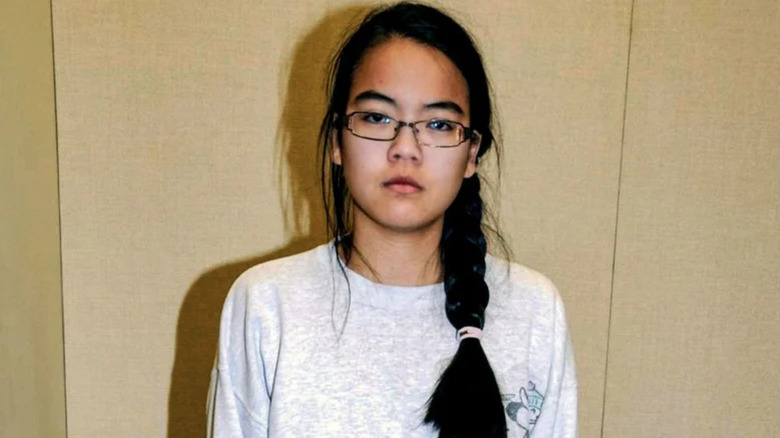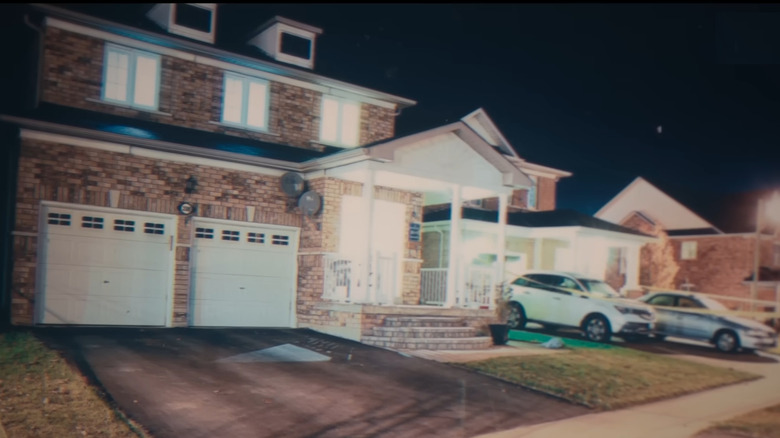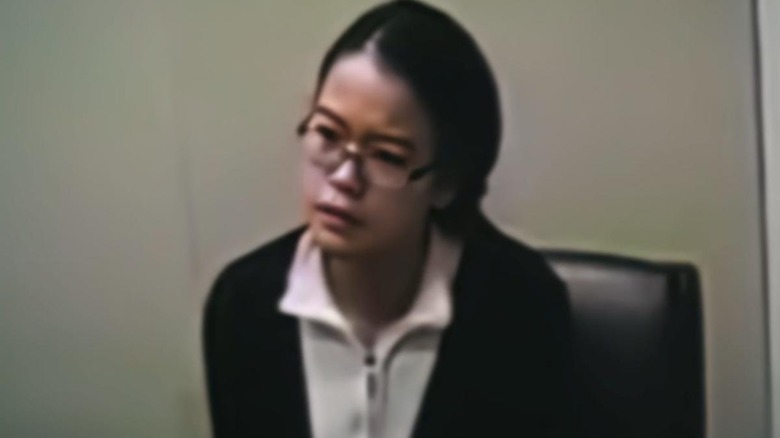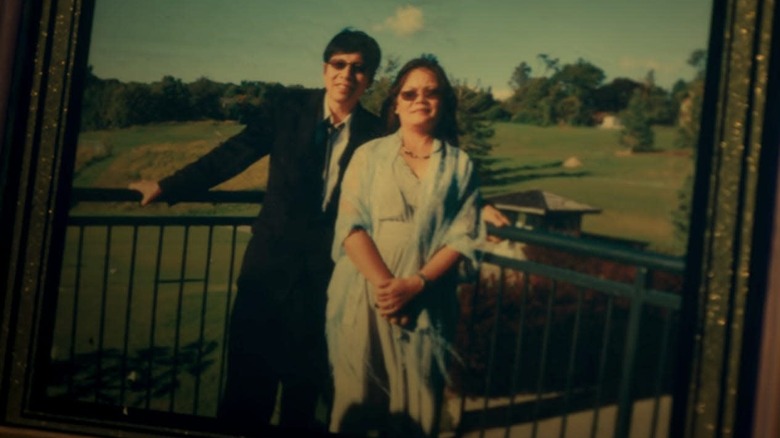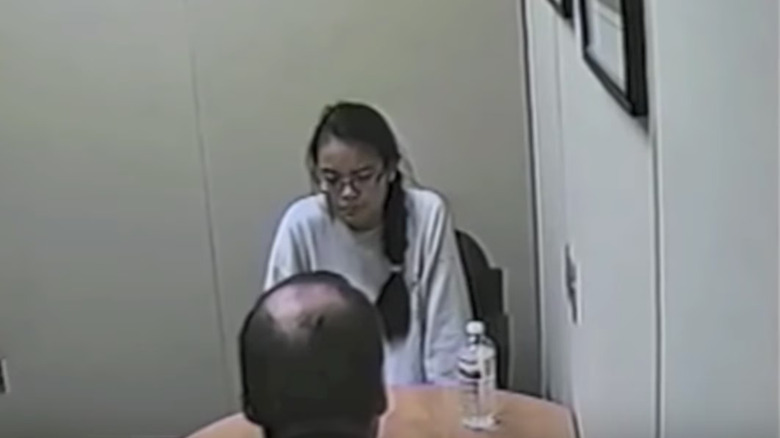The True Story Behind Netflix's What Jennifer Did, Explained
There are few things more terrifying than the idea of a home invasion, especially one that ends in violence. So when reports first broke of a 2010 home invasion in the relatively sleepy Toronto suburb of Marham, Ontario, that left one person dead and one in a coma, people were understandably shaken. Police, however, had reason to doubt the story told to them by the victims' daughter, 24-year-old Jennifer Pan, who was left allegedly restrained but unhurt and was able to call the police. As the details of that tragic November evening began to emerge, the world learned that Pan had potentially orchestrated the entire event and hired the "home invaders" to kill her parents.
In the 2024 Netflix documentary "What Jennifer Did," director Jenny Popplewell seeks to not only shine a light on the crime but to try and figure out the reasons why it happened in the first place, if at all possible. Compiling footage from police interviews and interviews with those close to the case, "What Jennifer Did" is a hard look at a crime that shook Toronto's immigrant community to its core.
The Jennifer Pan case explained
The Pan family seemed like any other immigrant family in Markham, their suburban city just outside of Toronto. Father Huei Hann Pan and mother Bich Ha Pan had both escaped Vietnam as refugees and met and married in Toronto before having a daughter, Jennifer, and a son, Felix. The Pans had high expectations for their children and were very strict, but the kids seemed to be succeeding. Unfortunately, Jennifer had long felt overwhelmed by their expectations for her and started lying about her achievements, forging report cards and even pretending to be in college at the University of Toronto when she was actually just hanging out with her high school boyfriend, cannabis dealer and pizza store manager Daniel Chi-Kwong Wong. When her parents discovered this, they banned her from seeing Wong and restricted her even more, despite Jennifer being in her 20s, leading to even more resentment.
Eventually, Jennifer and Wong came up with a plan to kill Jennifer's parents in order to get her inheritance and her freedom. They conspired to hire hitmen to do the job, and on November 8, 2010, Pan left the front door unlocked and called the hired killers to let them know. Lenford Roy Crawford, Eric Shawn Carty, and David Mylvaganam entered the house and went straight to the parents' bedroom, waking them and demanding money. They then took the parents to the basement and shot them both several times before leaving them for dead, taking $2,000 from Jennifer before leaving. Despite her claims that she had been tied up, she managed to call 9-1-1.
Bich Ha died on the scene of her wounds, while Huei Hann was taken to the hospital with grievous injuries. When he later woke from his coma, Jennifer's father implicated her in the crime, telling police that he had noticed his daughter speaking with the attackers in a friendly manner. 10 days later, Jennifer was arrested.
What happened to Jennifer Pan?
On December 13, 2014, Jennifer Pan and three of her co-conspirators — Lenford Crawford, David Mylvaganam, and Daniel Wong — were all found guilty of the first-degree murder of Jennifer's mother Bieh Ha Pan, and the attempted murder of her father, Hann Pan. The CBC reported that it took four days of deliberations and that Pan was silent while the verdict was read but began sobbing once the judge set her sentencing date for January of the following year. The sentencing date wouldn't really matter, however, as the first-degree murder conviction in Canada comes with an automatic life sentence with no possibility of parole for 25 years. (Due to Carty's attorney falling ill, his original case was declared a mistrial; he later was convicted of conspiring to commit murder and was sentenced to 18 years in prison before dying in his cell just a few years later in April of 2018. His death is still under investigation.)
On January 23, 2015, Pan and the three men were sentenced to two terms of life in prison, the harshest penalties possible, according to the Toronto Star. The judge informed them that they would be imprisoned until at least 2035 or so before they got the chance for parole, while Pan's brother Felix and her father Hann both obtained no communications orders for Jennifer, never wishing to see or speak to her again.
What happened to Jennifer Pan's dad, Huei Hann Pan?
Though he did not appear in court for the sentencing, Hann did provide a victim's statement to be read, and it was absolutely heartbreaking. He noted missing eating his wife's cooking and that they had longed to go back home to Vietnam together at some point. He said that the day his wife died, he "feels like he died too," living in a deep depression where he can no longer take joy out of the little things in life. He required strong pain medication to deal with the pain from the gunshots through his face and shoulder and was having a difficult time selling his home because people were superstitious about the events that happened there. Felix also wrote a statement, noting that he lost most of his friends and struggled from the pain of losing his mother to murder.
A 2015 profile of Jennifer's family by Toronto Life detailed Hann's struggles following Jennifer's sentencing, explaining that he was unable to find a buyer for his home and was also unable to work due to chronic pain and anxiety, forcing him to stay with nearby relatives. In the years since, both he and Felix have remained out of the public eye, trying to rebuild their lives.
The AI controversy behind What Jennifer Did
"What Jennifer Did" came under scrutiny for its use of images that were either generated with artificial intelligence (AI) or heavily edited using the technology, presenting them as authentic photographs of Jennifer. People online were quick to catch the tell-tale signs of AI imagery, like the absolutely nightmarish fingers in the above image, and Netflix has removed most of them from their marketing materials, though they do still appear in the film. AI use in documentaries is becoming more rampant, with the Netflix boy band doc "Dirty Pop" also coming under fire for its use of AI to re-create Lou Pearlman's voice and face so he can "speak" words he once wrote, and that's terrifying.
The use of generative AI is problematic in and of itself because it's generally based upon stolen images, but the use of AI in documentaries is even more morally sticky because the whole point of a documentary is to present facts. When you're using technology to try and present fiction as fact, we're in a whole new world of poor ethics.
What Jennifer Did is still another true-crime hit for Netflix
AI controversy aside, "What Jennifer Did" has done well for Netflix. Pan's case has been documented in true crime shows and podcasts previously, including an episode of the so-trashy-it's-good Investigation Discovery series "Deadly Women," which relies on campy re-enactments instead of the doc's decidedly more restrained take.
Netflix has become an online hub for true crime documentary films and series, with big, wild series like "Tiger King" blowing everyone's minds and even more recent, less exploitative fare like "Lover, Stalker, Killer" that have done really well for the streamer. "What Jennifer Did" is another in a long line of Netflix docs bringing unusual true crime cases to everyone's living rooms. Regardless of your feelings on true crime, the sheer number of high-profile Netflix crime docs is truly impressive and doesn't look like it will be going away anytime soon.
Why the case at the center of Netflix's What Jennifer Did isn't over yet
In May 2023, the Ontario Court of Appeal overturned the four first-degree murder convictions because it was felt that trial judge Cary Boswell didn't give the jury the option for second-degree murder and manslaughter. The court explained in its decision:
"The jury might have had a doubt about the planned and deliberate murder of Pan's mother but be satisfied that the appellants knew that the murder of Pan's mother was a probable consequence of a plan to kill her father. This could give rise to a conviction for second-degree murder."
The court also denied Pan's appeal for the life sentence for the attempted murder of her father. As of December 2024, things are currently in the hands of Canada's Supreme Court, which will hear appeals from both the prosecution and defense and decide whether or not to allow for a retrial. If the Supreme Court ends up agreeing to overturn the first-degree murder charge, Pan and her co-conspirators can begin seeking parole immediately on the attempted murder conviction.
